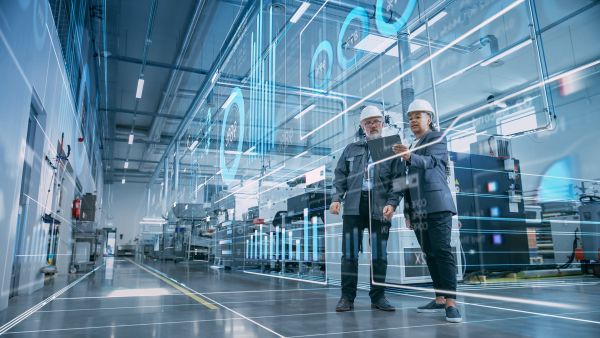ALBAWABA - In a groundbreaking development, artificial intelligence (AI) has surged into its 2.0 era, swiftly integrating into industries as a driving force for innovative product development. The once futuristic notion of AI has now become a reality, with various sectors adopting producer AI technologies to reshape their products and services.
This year has witnessed a rapid proliferation of producer AI across industries, disrupting traditional processes and seamlessly incorporating futuristic technologies into our daily lives. Concepts like autonomous vehicles, dark factories, and the Internet of Things (IoT) are no longer distant dreams but tangible achievements made possible through the amalgamation of AI technologies.
Recognized as a transformative force, producer AI is making significant inroads into diverse industries, revolutionizing business processes, innovation strategies, and growth dynamics. The advantages it offers span from changing work methodologies to enhancing business efficiency and supporting sustainable practices.
Gartner, a leading research and advisory company, emphasizes the numerous opportunities that this technology presents for companies to boost revenues, cut costs, and manage risks more effectively.
Language-Driven Revolution Across Industries
What sets producer AI apart is its language capabilities, proving to be a game-changer across various sectors. This technology's ability to analyze existing data and generate unique outputs, covering visuals, videos, music, speech, and code, positions it as a key player in the technological landscape.
In a recent survey conducted by Gartner, executives revealed that 38% of them see customer retention as the primary goal of their producer AI investments, while 26% aim to increase revenues, 17% focus on cost optimization, and 7% prioritize ensuring business continuity.
Industries, ranging from pharmaceuticals to household products, the food and beverage sector to material science, are witnessing significant innovation driven by producer AI. Projections indicate that over 30% of new drugs and materials in the pharmaceutical industry will be discovered using productive AI by 2025, presenting substantial revenue opportunities for organizations effectively integrating AI into their core operations.
The impact of producer AI extends to how employees interact with various media formats, facilitating tasks like content creation and software development. Collaborative efforts between teams and AI are accelerating project design, execution, and improvement processes, leading to a faster pace of skill development within organizations.
As AI 2.0 continues to evolve, it is poised to play a pivotal role in shaping the future landscape of industries, fostering innovation, and redefining operational paradigms in the years to come. Stay tuned for more updates on this transformative journey into the next era of artificial intelligence.










